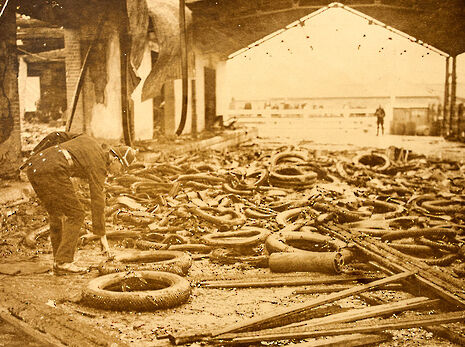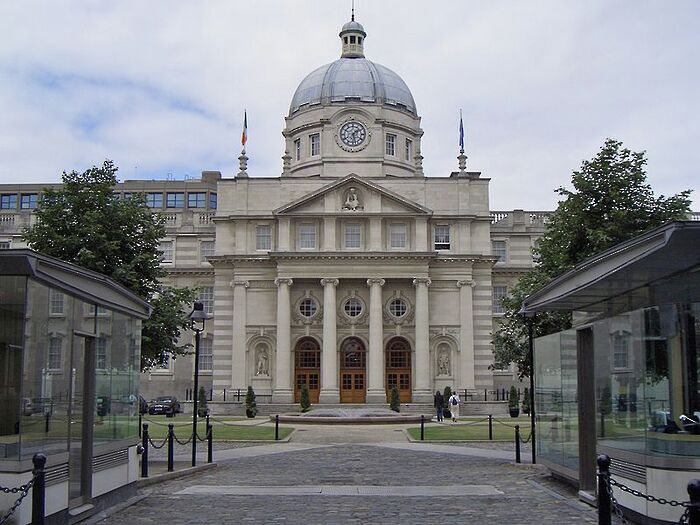Don’t use Ireland as a Brexit model
In her third column on Anglo-Irish relations, Nadia Hourihan criticises politicians’ use of Ireland’s exit from the Union as a model for Brexit

It whisper’d too, that freedom’s ark And service high and holy
Would be profaned by feelings dark And passions vain or lowly;
For, Freedom comes from God’s right hand And needs a Godly train;
And righteous men must make our land A Nation once again!
You’ve finally stood up for yourself. You’ve made the world take notice. You will strike out of the Union and become a sovereign nation once again. You’re the first to strike out from a great union in decline. You might pave the way for others to follow.
But now the negotiations have started. You’re miles from home. You’re an economic pipsqueak next to the mammoth market you’re hellbent on leaving. Your negotiating skills look just a little rusty next to the other guys. You made massive promises to people at home, and you’re quickly learning that you won’t be able to keep very many of them. In fact, you’ve never really had any aces up your sleeve. You’re going to get a nasty deal, to warn off any other departures. Increasingly, your government looks primed to self-destruct as soon as a disappointing deal is reached.
Oh, and if you can’t cut a compromise then ‘swift and terrible war’ will follow.
“The irony of Brexiteers trumpeting the Irish struggle for independence as a model for their own is as unsettling as it is entertaining”
I’m not quite talking about Brexit. I’m talking about Irish independence. In the above scenario, the year is 1921 and you are Ireland. The gentlemen promising to destroy you if you dare dangle ‘no deal’ across the table are Winston Churchill, David Lloyd George, Lord Birkenhead, Austen Chamberlain, Sir Laming Worthington-Evans, Sir Gordon Hewart and Sir Hamar Greenwood.
I’m not the first to draw this parallel. Oddly enough, prominent Brexiteers have referred to the Irish struggle for independence as a model for Brexit.
I come from a staunchly Republican family. Every Christmas, when my family gathers together, one of my uncles will start to praise Ireland for having toppled the British Empire at the apogee of her power. Look at us go. Weren’t we impressive? Weren’t we great?
In the highfalutin rhetoric of the Brexiteers there are echoes of my uncles after a few too many drinks.
One has to wonder if they’re aware of the civil war that followed the Anglo-Irish treaty. Or the assassination of Irish politicians thought to have broken promises of a truly independent nation.
Or that, some fifty years later, Ireland entered a new Union: the European Union.
The irony of Brexiteers trumpeting the Irish struggle for independence as a model for their own is as unsettling as it is entertaining.
Today’s Brexit negotiations are taking place in a very different context to the Anglo-Irish negotiations of 1921. But they have in common the capacity to deconstruct political dreams and sour the moods of nations. Almighty concessions have been made, and there are more to come. Like the negotiations of 1921, the Brexit talks have been confused by domestic politicians who are cynically exploiting the weakness of their negotiating hand to shore up support within their parties.
In Jacob Rees-Mogg I can almost see Éamon de Valera. In much the same way that De Valera published his proposals for external association, Rees-Mogg has been preaching from the sidelines, currying favour with hardliners at home and confounding and confusing those abroad. They are ideological purists, happy to let others dirty their hands while crowing that the nation is being cheated of glory by the treachery of others. Paddy Power thinks that he’s the most likely candidate to lead the party after Theresa May has been ousted. He may yet lead a newly independent nation, and fashion it into a bastion of (Catholic) conservatism as the economy shrinks and shrinks.
In school, I would sometimes relay some of what I picked up in class to my friends who didn’t study history. To hold their attention, I had to be funny. I turned the Anglo-Irish treaty negotiations into a five-minute stand-up routine. It’s surprisingly easy to rework it into a (dark) comedy of errors.
It requires little imagination to see future historians treating the Brexit negotiations with the same irreverence. We may yet find ourselves laughing together
 News / Judge Business School advisor resigns over Epstein and Andrew links18 February 2026
News / Judge Business School advisor resigns over Epstein and Andrew links18 February 2026 News / Hundreds of Cambridge academics demand vote on fate of vet course20 February 2026
News / Hundreds of Cambridge academics demand vote on fate of vet course20 February 2026 News / Gov grants £36m to Cambridge supercomputer17 February 2026
News / Gov grants £36m to Cambridge supercomputer17 February 2026 News / CUCA members attend Reform rally in London20 February 2026
News / CUCA members attend Reform rally in London20 February 2026 News / Petition demands University reverse decision on vegan menu20 February 2026
News / Petition demands University reverse decision on vegan menu20 February 2026










